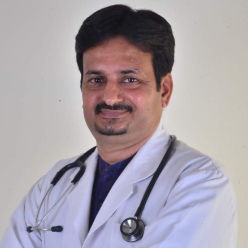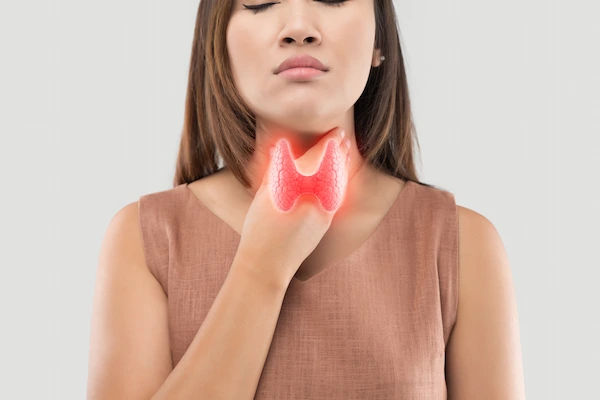Is Thyroid Disorder Curable?
Discover whether thyroid disorders can be cured, treatment options available, and the importance of lifestyle changes in managing conditions like hypothyroidism and hyperthyroidism. Learn about long-term management strategies.

Written by Dr Sonia Bhatt
Last updated on 3rd Jul, 2025
The thyroid gland regulates metabolism, heart rate, brain function, and other activities through adequate stimulation of the hormones thyroxine (T4) and triiodothyronine (T3). However, over or under-stimulation of these hormones can lead to thyroid disorders like hyperthyroidism and hypothyroidism.
Neglecting these disorders can cause severe health complications, including heart disease, infertility, neurological issues, etc. Thus, proper treatment is necessary to control thyroid function for a healthy life.
Keep reading to know the possibilities of treatment and cure for thyroid disorders.
What are the Causes and Risk Factors of Thyroid Disease?
Several factors lead to thyroid disorders in a person, with the most common cause being the following:
1.Genetic Predisposition
Individuals with a family history of thyroid disorder have a higher risk of developing this condition. Genetic mutations can predispose a person to autoimmune disorders like Hashimoto’s thyroiditis or Grave’s disease. These autoimmune diseases are the primary cause of thyroid disorders like hypothyroidism and hyperthyroidism.
2.Environmental Factors
Apart from the genetic predisposition, multiple environmental and lifestyle factors lead to the risks of thyroid disorders. Individuals exposed to radiation therapy in the past for head or neck-related diseases have been diagnosed with higher risks of thyroid disorders.
3.Lifestyle Factors
Some eating habits like high iodine intake, deficiency of certain vitamins, etc., can lead to thyroid disorders. Excessive smoking also causes thyroid imbalance. The cyanide in tobacco changes into the chemical thiocyanate during smoking. The thiocyanate reduces triiodothyronine (T3) and thyroxine (T4) hormone production, affects the absorption of iodine in one’s body, and increases iodine excretion.
All these affect thyroid function in one’s body. Moreover, excessive stress can slow down the metabolism, increasing the chances of thyroid disorders.
What are the Symptoms of Thyroid Disorders?
Here are some of the symptoms that help identify thyroid disorders in one’s body:
Signs of Hypothyroidism
- Sensitivity to cold
- Skin and hair dryness
- Weight gain
- Constipation
- Weak muscles
- Loss of appetite
- Irregular and heavy menstrual flow
- Hair thinning
- Depression
- Slow heart rate
- Hoarseness in voice, etc.
Signs of Hyperthyroidism
- Sensitivity to heat
- Frequent bowel movements
- Excessive sweating
- Irregular and fast heart rate
- Increased appetite
- Moist skin
- Brittle hair
- Sleeping disorders
- Tiredness
- Anxiety
- Tremors in hand and fingers, etc.
Diagnosis of Thyroid Disorders
Thyroid disorders can be diagnosed in the following ways:
Blood Tests
Blood tests help detect the level of thyroxine (T4), triiodothyronine (T3), thyroid antibody, and thyroid-stimulating hormones (TSH) in one’s body. It helps detect whether the person has hyperthyroidism (overactive thyroid) or hypothyroidism (underactive thyroid), depending on the increase or decrease in the hormone levels.
Imaging Studies
It includes ultrasound and CT scans to detect the growth of nodules or lumps in one’s thyroid gland by capturing digital images. Doctors also suggest radioactive iodine uptake, a nuclear medicine imaging, to detect if the lumps are underactive or overactive.
Get Your Thyroid Levels Assessed
Treatment Options for Thyroid Disorders
The treatment options for thyroid disorders include the following:
Medication Management
In hypothyroidism, one’s thyroid gland produces fewer hormones than required. This condition is treated with medicines containing levothyroxine to replace the deficiency of thyroid hormones in one’s body. Depending on the TSH level in one's blood, Doctors may change the dosage and duration of medication.
However, for hyperthyroidism, the patients are treated with antithyroid medicines to slow down excessive hormone production. Medicines containing propylthiouracil and methimazole are prescribed by doctors to treat overactive thyroid.
Surgical Interventions
Individuals suffering from hyperthyroidism can undergo surgery to remove an entire or a part of their thyroid based on the hormone secretion level. However, if the thyroid is removed to reduce hormone production, one needs to intake synthetic hormones in the form of medicines to balance the TSH, T3, and T4 levels.
Is Thyroid Curable?
The answer to this question is tricky, as thyroid can be treated and normalised but not cured completely in most cases. Individuals suffering from thyroid disorders need to take medicines regularly to maintain normal thyroid function.
The Curability of Different Types of Thyroid Disorders
Disorders like thyroid cancer have greater chances of curability through radioactive treatments and surgery. The cancer is curable, but it leads to conditions like hypothyroidism, as the removed thyroid gland cannot secrete hormones for normal bodily function.
Hypothyroidism is also caused by autoimmune diseases like Hashimoto’s thyroiditis in which the antibodies attack the thyroid gland and lower the hormone production. In such cases, patients can undergo hormone replacement medication therapy to balance their hormone levels. This condition is treatable through proper medication and routine checkups.
Again, in hyperthyroidism (primarily caused due to Grave’s disease), the antibodies prompt the thyroid gland to overstimulate hormones. This condition can be cured through surgical intervention, but again, it may lead to hypothyroidism due to compromised hormone secretions.
Long-term Management vs. Cure
Some thyroid conditions can be managed effectively with proper medication and the right treatments. However, the underlying issues remain unsolved, or the treatment procedure may lead to another thyroid disorder.
Therefore, it is essential to monitor the condition and manage the treatment procedure accordingly to maintain normal thyroid function. One needs to visit the healthcare provider regularly for routine checkups and proper guidance on the dosage of medication.
Find Top Doctors for Personalised Treatment
Lifestyle and Dietary Modifications for Thyroid Disorders
Medicines alone may not be able to control thyroid disorders. One needs to make some significant changes in eating habits and lifestyle for a healthy thyroid state.
Diet Changes for Thyroid Health
Vitamin D and B12 deficiency can lead to Hashimoto’s disease, increasing the risk of hypothyroidism. Intaking the following foods rich in selenium, vitamin B12, and D can restore one’s thyroid health:
- Fish
- Meat
- Sunflower seeds
- Tuna
- Milk
- Brazil nuts
- Crabs
- Eggs
- Dairy products, etc.
Too much iodine intake can cause thyroid disorders, but iodine deficiency is also responsible for the same. So, one’s diet must include adequate iodine in the form of iodised salt, seafood, shellfish, etc.
Importance of Regular Exercise
Inadequate physical activity can lower the thyroxine level in one’s body, affecting the thyroid function. Regular exercise and physical activity are necessary to strengthen muscle mass, improve cardiovascular fitness, regulate metabolism etc., and maintain thyroid health.
Apart from that, stress management programmes like yoga and meditation are also necessary to ensure sound mental health. An active body and sound mind help regulate the thyroid state and maintain other bodily functions.
Alternative Treatment Options for Thyroid Disorders
Apart from medicines and surgeries, one can try some alternative therapies to control thyroid function.
Role of Supplements and Nutrition
Deficiencies of certain nutrients can cause thyroid disorders like hypothyroidism. Intaking the following supplements can contribute to normalising this condition:
- Zinc
- Vitamin B12
- Selenium
- Iodine
Acupuncture and other Complementary Therapies
Another alternative treatment to regulate the hormone level in one’s body is through acupuncture. As per research, this treatment can increase hormone production, thereby proving an effective measure for those dealing with hypothyroidism.
However, one must consult their healthcare provider before undergoing such treatments to ensure safety. Acupuncture also helps regulate the blood circulation level, reduce inflammation, improve joint stability, etc.
Complications of Untreated Thyroid Disorders
If left untreated, thyroid disorders can disrupt various body functions, including the following:
Impact on Cardiovascular Health
Both hypothyroidism and hyperthyroidism affect the heart function adversely. Low hormone production levels can lead to high levels of LDL (low-density lipoprotein cholesterol), causing heart failure or heart attack.
On the other hand, high hormone levels can lead to increased and irregular heart rate. If not controlled, it can cause heart diseases like atrial fibrillation (irregular heart rate), congestive heart failure, etc.
Mental Health Implications
Thyroid disorders also affect the mental health of an individual, causing complications like peripheral neuropathy, mood disorders, anxiety, depression, etc.
Conclusion
Thyroid disorders can often be effectively managed with appropriate treatments, medications, and lifestyle changes, but a complete cure is rare. Early diagnosis and consistent care are essential to prevent complications and maintain overall health. Regular checkups and a proactive approach can ensure long-term management of thyroid health.
Consult Top Endocrinologist
Get Your Thyroid Levels Assessed
₹536(₹1341)60% off
₹2364(₹5910)60% off
₹2472(₹6179)60% off
₹1505(₹3763)60% off
₹2999(₹7498)60% off
Find Top Doctors for Personalised Treatment

Dr. Mary Susan K S
General Physician/ Internal Medicine Specialist
13 Years • MBBS, MD INTERNAL MEDICINE
Bengaluru
Apollo Clinic, Sarjapur Road, Bengaluru

Dr Venkata Naga Sai Tribhushan Rambhatla
General Physician
3 Years • MBBS
Bengaluru
PRESTIGE SHANTHINIKETAN - SOCIETY CLINIC, Bengaluru

Dr. Shruthi B
Endocrinologist
20 Years • MBBS,MD ( GEN MED) DM (ENDOCRIONOLOGY)
Bengaluru
Apollo Clinic, JP nagar, Bengaluru

Dr. Anand Ravi
General Physician
2 Years • MBBS
Bengaluru
PRESTIGE SHANTHINIKETAN - SOCIETY CLINIC, Bengaluru

Dr. Shrikrishna V Acharya
Endocrinologist
25 Years • MBBS, MD, DM(Endocrinology), MRCP (Endocrinology)
Bengaluru
Apollo Clinic, JP nagar, Bengaluru
Consult Top Endocrinologist

Dr. Mary Susan K S
General Physician/ Internal Medicine Specialist
13 Years • MBBS, MD INTERNAL MEDICINE
Bengaluru
Apollo Clinic, Sarjapur Road, Bengaluru

Dr Venkata Naga Sai Tribhushan Rambhatla
General Physician
3 Years • MBBS
Bengaluru
PRESTIGE SHANTHINIKETAN - SOCIETY CLINIC, Bengaluru

Dr. Shruthi B
Endocrinologist
20 Years • MBBS,MD ( GEN MED) DM (ENDOCRIONOLOGY)
Bengaluru
Apollo Clinic, JP nagar, Bengaluru

Dr. Anand Ravi
General Physician
2 Years • MBBS
Bengaluru
PRESTIGE SHANTHINIKETAN - SOCIETY CLINIC, Bengaluru

Dr. Shrikrishna V Acharya
Endocrinologist
25 Years • MBBS, MD, DM(Endocrinology), MRCP (Endocrinology)
Bengaluru
Apollo Clinic, JP nagar, Bengaluru



